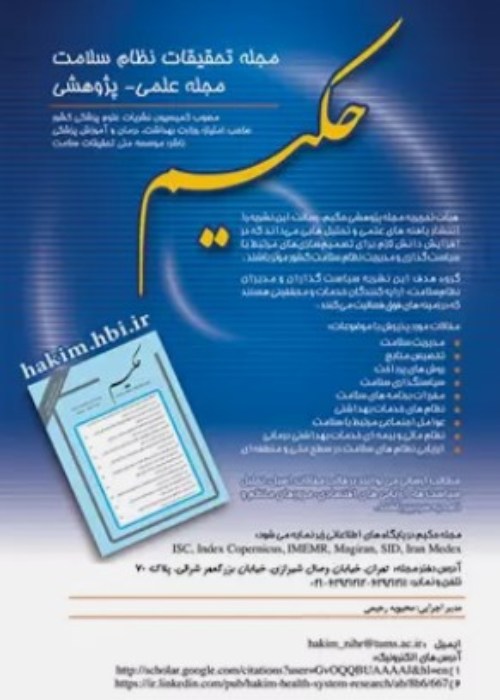Male Participation in Family Planning in Zanjan, 2011: a Qualitative Study
Author(s):
Abstract:
Introduction
This study aimed to investigate male participation in reproductive health and family planning in Zanjan in 2011. Methods
This was a qualitative study conducted among married men resided in rural and urban areas of Zanjan. A conceptual model was considered for the study based on the literature and existing theories of reproductive behaviors to guide the interviews and direct the queries. The deductive content analysis was used as the main approach for this study. Purposive sampling with maximum variability was used to select the participants. Data were collected via 33 semi-structured and in-depth interviews during July-Aug 2011. Topics discussed included knowledge، attitude (towards family planning and gender roles)، risk perception، behavior and environmental factors. Data were analyzed using conceptual framework and conceptual mapping approach. Results
The data of this study was categorized into three main areas: 1) Nature of male participation; 2) Facilitators of male participation; and 3) Barriers of male participation. Nature of male participation included verbal communication with spouse about contraception، mutual understanding of spouse’s reproductive health needs and use of male contraceptive methods. Facilitators of male participation included education and living in urban areas، knowledge about contraceptives and access to media، positive attitudes towards family planning and gender issues. The barriers of male participation included inappropriate working hours of health clinics which provide contraceptive and counseling services، lack of access to male health care providers in such clinics، negative gender beliefs، and complications related to some male methods and low risk-perception towards sexually transmitted diseases. Conclusion
Although men’s attitudes towards participation in reproductive health and family planning in Zanjan seems to be appropriate، there were some barriers prevented men from participating in family planning actively. These barriers included inappropriate working hours of family planning clinics، lack of access to male health care provider، some gender beliefs and complications and inconvenience of using male methods and lack of knowledge on contraceptive methods. Appropriate interventions based on the results of this study might enhance male participation in family planning.Keywords:
Language:
Persian
Published:
Hakim Health Systems research journal, Volume:16 Issue: 1, 2013
Pages:
50 to 57
magiran.com/p1139915
دانلود و مطالعه متن این مقاله با یکی از روشهای زیر امکان پذیر است:
اشتراک شخصی
با عضویت و پرداخت آنلاین حق اشتراک یکساله به مبلغ 1,390,000ريال میتوانید 70 عنوان مطلب دانلود کنید!
اشتراک سازمانی
به کتابخانه دانشگاه یا محل کار خود پیشنهاد کنید تا اشتراک سازمانی این پایگاه را برای دسترسی نامحدود همه کاربران به متن مطالب تهیه نمایند!
توجه!
- حق عضویت دریافتی صرف حمایت از نشریات عضو و نگهداری، تکمیل و توسعه مگیران میشود.
- پرداخت حق اشتراک و دانلود مقالات اجازه بازنشر آن در سایر رسانههای چاپی و دیجیتال را به کاربر نمیدهد.
In order to view content subscription is required
Personal subscription
Subscribe magiran.com for 70 € euros via PayPal and download 70 articles during a year.
Organization subscription
Please contact us to subscribe your university or library for unlimited access!


